- Home
- John Jakes
The Bold Frontier Page 6
The Bold Frontier Read online
Page 6
He swayed in the middle of the yard, blinking. He tilted his head back to look at the sun, then groaned. He peered around the yard. His hand moved aimlessly. “Hello, ol’ Jacknife, hello, ol’ Tracy. Damned four days, too damned long.”
“You better sober up,” Jacknife said, worried. “I want to split the money and light out of here.”
“Nobody comes to Apache Wells any more,” Pawker said. “Tracy, fetch the bottles out o’ my saddle, huh?”
“I don’t want a drink,” Tracy said. Lola stood in the doorway now, watching, but Pawker did not see her. If he had, he would have seen the disillusionment taking root. Tracy smiled a little. Grabbing the money would be a pleasure.
“Listen, Pawker,” Jacknife said, approaching him, “let’s divvy the cash and forget the drink—”
Suddenly Pawker snarled and pushed the old man. Jacknife stumbled backward and fell in the dust. Pawker spat incoherent words and his right arm flashed across his body. The pistol came out and exploded loudly in the bright air. A whiff of smoke went swirling away across the old wooden roofs.
Jacknife screamed and clutched his hip. Tracy jumped off the fence and came on Pawker from behind, ripping the gun out of his hand and tossing it away. He spun Pawker around and hit him on the chin. The blond man skidded in the dust and scrabbled onto his knees, some of the drunkenness gone. Glaring, he slid his left hand across his body and down.
Tracy pointed his gun straight at Pawker’s belly. “I’d like you to do that,” he said. “Go ahead and draw.”
Cunning edged across the other man’s face. His hand moved half an inch further and he smiled. Then he giggled. “I’m going to throw my gun away, Tracy boy. I don’t want trouble. Can I throw my gun away and show you I’m a peaceable man?”
Tracy took three fast steps forward and pulled the gun from its holster before Pawker could seize it. Then he turned his head and said, “Lola, find the satchel and get horses.”
Pawker screamed the girl’s name unbelievingly, turning on his belly in the dust to stare at her. He began to curse, shaking his fist at her, until Tracy planted a hand on his shoulder, pulled him to his feet and jammed him against the wall of the building with the gun pressing his ribs.
“Now listen,” Tracy said, “I’m taking the satchel and I don’t want a big muss.”
“Stole my money, stole my woman,” Pawker mumbled. “I’ll get you, Tracy, I’ll hunt you up and kill you slow. I’ll make you pay, by God.” His eyes rolled crazily, drunkenly.
Jacknife was trying to hobble to his feet. “Tracy,” he wheezed, “Tracy, help me.”
“I’m taking the money,” Tracy said.
“That’s all right, that’s fine, I don’t care,” Jacknife breathed. “Put me on my horse and slap it good. I just want to get away from him. He’s a crazy man.”
Tracy shoved Pawker to the ground again and waved his gun at him. “You stay right there. I’ve got my eye on you.” Pawker snarled something else but he didn’t move. Tracy helped Jacknife onto his horse. The old man bent forward and lay across the animal’s neck.
“So long, Tracy. Hit him good. I want to get away—”
“You need a doctor,” Tracy said.
“I can head for some town,” Jacknife breathed. “Come on, hit him!”
Tracy slapped the horse’s flank and watched him go galloping out of the station yard and across the valley floor. Lola came around the corner of the building leading two horses. The satchel was tied over one of the saddlebags.
Tracy turned his head for an instant and when he turned back again, Pawker was scrabbling in the dust toward his gun which lay on the far side of the yard. Tracy fired a shot. It kicked up a spurt of dust a foot in front of Pawker’s face. He jerked back, rolling over on his side and screaming, “I swear to God, Tracy, I’ll come after you.”
Lola was already in the saddle. The horses moved skittishly. Tracy swung up and said, “Let’s get out of here.” He dug in his heels and the horses bolted. They headed west across the floor of the valley.
They rode in silence. Tracy looked back once, to see Pawker staggering away from the building with his gun, firing at them over the widening distance. Until they made camp in the early evening at a small grove, with the mountains still looming to the west, Tracy said almost nothing.
Finally, when the meal with its few necessary remarks was over, he said, “Pawker will follow us. We’ll have to keep moving.”
She answered absently, “I guess you’re right.” A frown creased her forehead.
“What’s the trouble?” He was beginning to sense the growth of a new feeling for this woman beside him. She was as silent and able as the hardened men with whom he had ridden in the last few years. Yet she was different, too, and not merely because she was female.
“I don’t know how to tell you this right, Tracy.” She spoke slowly. The firelight made faint red gold webs in her hair and the night air stirred it. “But—well—I think you’re an honest man. I think you’re decent and that’s what I need.” She stuck her finger out for emphasis. “Mind you, I don’t mean that I care anything about you, but I think I could.”
Tracy smiled. The statement was businesslike, and it pleased him. He knew that there was the possibility of a relationship that might be good for a man to have.
“I understand,” he said. “I sort of feel the same. There’s a lot of territory in California. A man could make a good start.”
She nodded. “A good start, that’s important. I made a mistake, I guess. So did you. But now there’s a chance for both of us to make up for that. I’m not asking you if you want to. I’m just telling you the chance is there, and I’d like to see if what I think of you is right.”
“I’ve been thinking the same,” he said.
They sat in silence the rest of the evening, but it was a silence filled with a good sense of companionship that Tracy had seldom known. For the first time in several years, he felt things might work out right after all. Right according to the way it had been before the war, not since.
The next morning, they doubled back.
It was a five-day ride to Wagon Bow. The job was carried off at around four in the morning. Tracy rode through the darkened main street at a breakneck gallop and flung the satchel of money on the plank walk in front of the bank. By the time the sun rose he and Lola were miles from Wagon Bow. The only troubling factor was Pawker, somewhere behind them.
He caught up with them when they were high in the mountains, heavily bundled, driving their horses through the lowering twilight while the snow fell from a gray sky. Actually, they were the ones who caught up with Pawker. They saw him lying behind a boulder where he had been waiting. A rime of ice covered his rifle and his yellow boy’s beard. His mouth was open. He was frozen to death.
Tracy felt a great relief. Pawker had evidently followed them, knowing the route they would probably take, and circling ahead to wait in ambush. It would have fitted him, rearing up from behind the boulder with his mouth open in a laugh and his avenging rifle spitting at them in the snow.
They stood for a time in the piercing cold, staring down at the body. Then Tracy looked at Lola through the veil of snow between them. He smiled, not broadly, because he wasn’t a man to smile at death, but with a smile of peace. Neither one spoke.
Tracy made the first overt gesture. He put his thickly clad arm around her and held her for a minute, their cold raw cheeks touching. Then they returned to the horses.
Two days later, they rode down out of the mountains on the trail that led to California.
Hell on the High Iron
THE LAND HAD A familiar rolling quality about it. Rome rode westward in the early dawn, a big, stocky man in his early thirties. He followed the movements of his horse easily, his clear gray eyes sweeping over the vast prairies. Those eyes suggested a quick mind, and his whole bearing said that he knew his mind could often help him just as much as the pistol strapped to his right hip.
It was a sort of homecoming.
He followed the tracks, two bands of iron stretching ahead of him. The business was well taken care of, the morning air had a cool crispness, and he was in high spirits. The sun glinting from the rails seemed to symbolize the future, alive with pleasant prospects.
His mood changed abruptly around noon when he rode into the end-of-track of the Kansas & Western. The place had an air of idleness. Here and there, groups of section hands sat near piles of ties, drinking coffee and playing cards. He heard no clang of hammers on spikes, no curses of men sweating under the sun. Work had stopped. The rails no longer crept inevitably toward the Rockies.
As troubleshooter it would be his job to iron out whatever was slowing up the work. His mind moved rapidly over the possible causes as he dismounted and tied his horse to the platform rail of the office car. He took the steps two at a time and slammed the door behind him.
Ben Hamilton, the wiry, white-haired head of the Kansas & Western, sat behind his desk, staring at Rome over the top of a coffeepot. His eyes were red with sleeplessness. Rome waited for him to speak, sensing defeat in the slump of Hamilton’s shoulders.
At last the older man sighed. He switched his gaze to the coffeepot and poured himself another cup. “Hello, Mark. You want some coffee? It’s cold …”
“No, thanks,” Rome answered. He swung his leg across a chair before the desk, resting his arms on the back.
“You don’t look very good, Ben.”
Hamilton laughed in a cracked tone and gulped some of the coffee. “I guess not, Mark. How’s things in Saint Louis?”
Rome gestured. “All cleared up. The hitch was coming from back East. We’ll be getting rails and spikes to spare in a couple of days.”
“Don’t know as it’ll do us much good,” Hamilton commented sourly.
“Ben, you might as well spill it. It’s my job.”
The older man sighed again. “All right, dammit. It’s simple enough. We’re stopped. Turns out we don’t have the right of way we need through three of the spreads. The owners refuse to sell. So we can’t meet our contract. It’ll mean an extra week if it turns out that we have to bypass Warknife.”
Rome sat up abruptly. “Warknife!” He hadn’t realized they were that close.
“Yeah. You know the town?”
Rome nodded. “I was born there. Lived there until I was eighteen, before I went East.”
“Fine.” Hamilton’s tone was sarcastic. “You must have a lot of friends there. One hell of a lot of good that’ll do us.”
Friends. The word stung Rome. More than friends. Cathy Thompson. He remembered her, painfully. Remembered how much he’d been in love with her, how many times they had ridden together, hunted together—and laughed at the antics of the young calves together.
Rome knew then it wouldn’t work. The cattle were in her blood. They were her life and her heritage. She could only see cattlemen, and no one else. For him there had been another call, from the East, from the world where the iron horse was beginning to move and bellow as it cut the continent in half. Since that morning, years ago, when he saw locomotives standing on the wharf of Saint Louis, the railroad had captured him.
Sitting before Hamilton in the shadowy car as the older man stared at him, Rome thought about each of the two dreams. The iron horse. He had caught that excitement as a small boy and never lost it. Then came Cathy, when he was older. The two couldn’t live side by side, not then. The smokestack, the churning pistons, the wheels westward, the whistle-scream … the railroad won. He left Warknife and Cathy and went East.
Now he was here again. One dream had been fulfilled, but the other still left its empty ache within him.
“Why all the trouble?” he asked at last. “I thought our buyers had the land contracts sewn up a year ago.
“So did we,” Hamilton exclaimed. “Why, dammit, we were set to lay track all the way to the mountains, picking up the contracts as we went along!”
“Didn’t our buyers get anything on paper?”
Hamilton shook his head. “They should have. That was where we slipped.”
“Everybody slips once in a while,” Rome told him. “We’ve got to correct the slip, that’s all.”
“Look!” Hamilton exclaimed. Rome realized that the man’s nerves were frayed. “We’ve been trying for the last four days. Somebody’s stirred up the three ranchers—most of the town, in fact—and they’re dead set against the railroad coming through. Or at least that’s the way it stacks up.”
“Any particular reason?”
“God knows. A lot of hogwash about too much too quick. I’ve got a pretty good idea who’s behind it. An hombre named Bruce Gashlin. He’s got his main office in Warknife.” Hamilton paused. “Central Kansas Overland Company.”
“Stages, eh?”
“Yeah, and we can’t fight ’em, not legally at least. It’s all in folks’ minds, the way it appears to me. Progress is comin’ too fast. The coaches have worked for them well enough for a long time, so why change? A little fast talking here and there, and we’re blocked.”
“You had any trouble?”
“Not much. Couple of boys got in an argument at the Emporia and got cut up a little, but that’s all. But I think this Gashlin has it in him to make serious trouble for us if he wants. He has one boy working for him named Yancey who looks like a real killer.”
Rome picked a cigar out of the inlaid box on the top of the desk. He struck a match to it and inhaled the strong smoke. “I’ve got a pretty good idea of what you want me to do.”
“Thought you would.”
“I’d like to know the names of the ranchers with the land we need for the right-of-way.”
Hamilton pulled out one of the desk drawers, shuffled through a sheaf of papers, and drew one out, laying it on the desk before him. He scanned it a moment. “Harry Drew, Giles McMaster, and Job Thompson.”
Once again the knife of memory and regret twisted. Job Thompson … Cathy’s father, big and powerful and rock-faced, with his voice like velvet thunder. When the children of the Warknife Congregational Sunday School had thought of God, they thought of Job Thompson’s voice.
And Cathy … The prospect of seeing her again worried Rome. By now she must be married. Any number of younger ranchers with small spreads near Warknife would have found her a fine wife. And a beautiful one at that.
Rome eased himself to his feet and looked straight at Hamilton, trying not to show his tangled emotions. “I’ll ride in and see what I can do.”
“You’re a good talker, a damned good talker. Maybe you can get ’em to change their minds.”
“I’ll try.”
Hamilton jabbed a warning finger at him. “Let me tell you something, Mark. I know you’re never anxious to use that gun of yours, but I’ve met this Gashlin, and, believe me, he’s somebody to watch out for. He hates us. And Yancey’s nothing but a paid killer. Gashlin’s got a bunch of them working for him, but this Yancey’s the worst. He hung around Dodge City for a long time, I hear.”
“I’ll watch out,” Rome promised. With a brief farewell wave, he left the office car and swung up into his saddle, moving at a brisk trot out through the end-of-track camp.
It still lay quiet under the burning yellow of the noon sun. The sound of a harmonica lifted mournfully from somewhere beyond the cook car.
Outside the camp, Rome kicked his mount to a gallop. Warknife lay less than a half mile away. He felt ashamed that he had forgotten so much of the territory in the years he’d been gone.
Warknife itself hadn’t changed greatly. The board fronts were still there, some with new coats of paint, some worn even more from the weather than he remembered. He rode slowly through the main street, noticing the new druggist’s shop, the new name posted over the livery stable. A hundred boyhood incidents flooded back: memories of warm summer evenings near the stable, of the excitement of the first rolled cigarette, the first church meeting. His father, his mother … They were vague figures; sad-faced people broken by years of work in the general-
store business. Someone named Hopeman now owned the store, he saw.
No one recognized him. He rode slowly through the main street. People bustled on the sidewalks doing after-dinner shopping. Cattlemen were in the saddle on various errands. The loungers on the front porch of the Emporia Saloon paid no attention to him. He spied the Reverend Paxton, who peered at him from the sidewalk for a minute. Rome stared back impassively. Paxton’s eyes took in the gun on his hip, the rawboned body, the determined face. No expression of recognition appeared. Rome felt a little lonely then.
The Circle JT lay three miles on the other side of Warknife to the northwest. Rome caught his breath angrily as he saw that the land would make a perfect right-of-way. Except for a deep cut in the midst of a stretch of uncleared timber that would have to be bridged, construction would be relatively easy.
The yard of the ranch house was empty. Most of the hands, including Thompson himself, would be out on the range. Rome tied his horse and walked across the porch, conscious of the loud sound of his boots. He knocked.
Mrs. Thompson, a stout woman with a retiring manner, came to the door. She stared at him with the gaze she must have reserved for strangers, Rome thought. She made no attempt to recognize him. They had all forgotten. …
“Yes, sir, good afternoon,” she said, “what can—?” She caught her breath abruptly. “Why, my goodness! Is it … Mark Rome? Is it?”
Rome grinned. “Yes, ma’am, it is.”
Mrs. Thompson opened the front screen quickly. “My heavens, boy, come in!” She ushered him into the parlor, a musky place smelling of handmade lavender sachets and adorned with the customary motto, God Bless Our Home, on the wall. “Sit down, Mark,” she said affably. “I’ll call Cathy.” She raised her voice. “Cathy? Cathy, come see who’s here.”
Rome turned his hat in his hands. In a moment Cathy appeared from the kitchen. She stared at him, a slender woman with brown hair, frank brown eyes, and a faintly sensual mouth set in an oval face. She was still very good to look at, he thought.

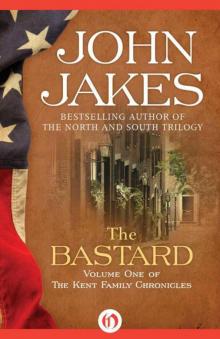 The Bastard
The Bastard The Furies
The Furies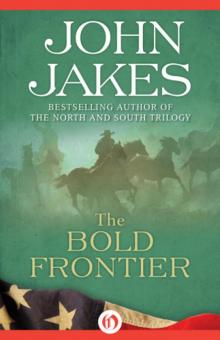 The Bold Frontier
The Bold Frontier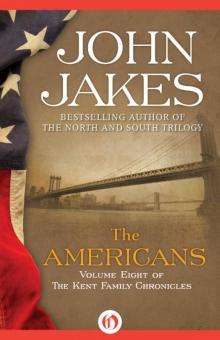 The Americans
The Americans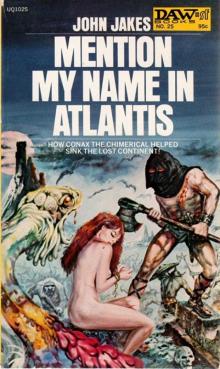 Mention My Name in Atlantis
Mention My Name in Atlantis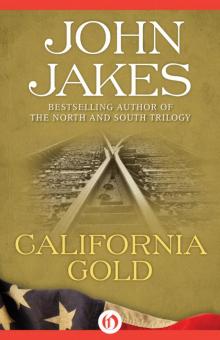 California Gold
California Gold North and South
North and South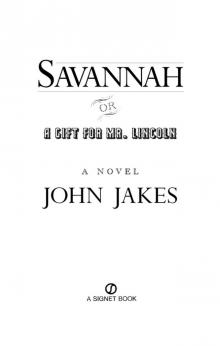 Savannah, or a Gift for Mr. Lincoln
Savannah, or a Gift for Mr. Lincoln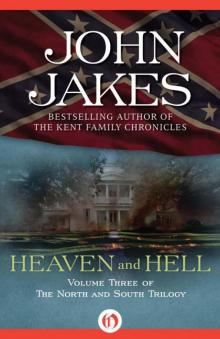 Heaven and Hell
Heaven and Hell Homeland
Homeland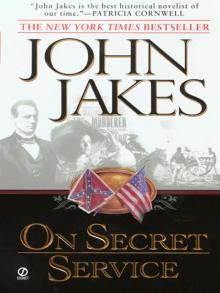 On Secret Service
On Secret Service The Lawless
The Lawless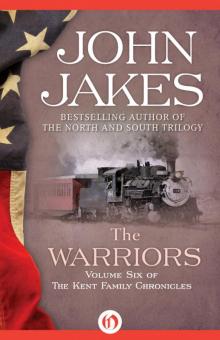 The Titans
The Titans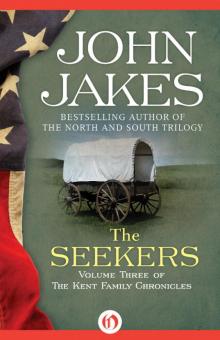 The Seekers
The Seekers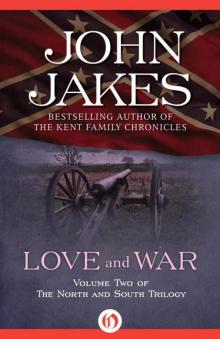 Love and War
Love and War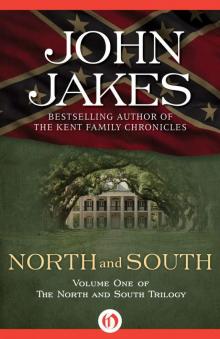 North and South: The North and South Trilogy (Book One)
North and South: The North and South Trilogy (Book One)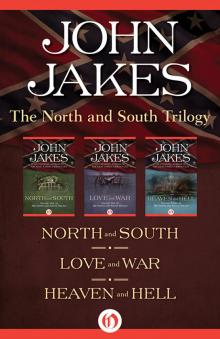 North and South Trilogy
North and South Trilogy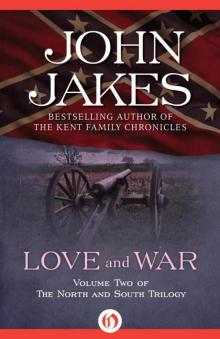 Love and War: The North and South Trilogy
Love and War: The North and South Trilogy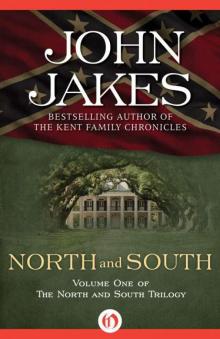 North and South: The North and South Trilogy
North and South: The North and South Trilogy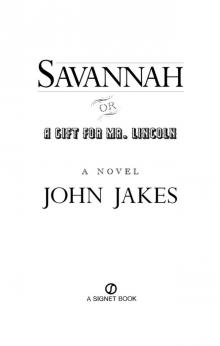 Savannah
Savannah Lawless
Lawless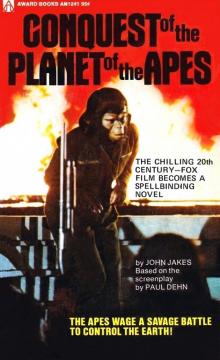 Conquest Of The Planet Of The Apes
Conquest Of The Planet Of The Apes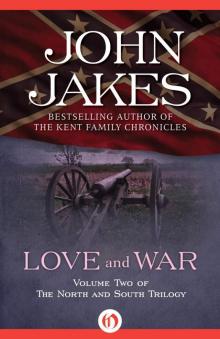 Love and War: The North and South Trilogy (Book Two)
Love and War: The North and South Trilogy (Book Two)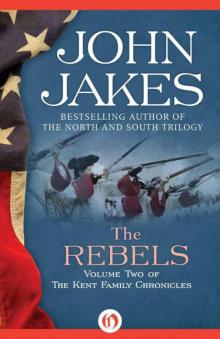 The Rebels: The Kent Family Chronicles
The Rebels: The Kent Family Chronicles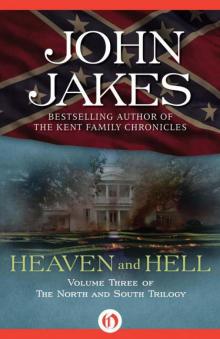 Heaven and Hell: The North and South Trilogy
Heaven and Hell: The North and South Trilogy Planet of the Apes Omnibus 2
Planet of the Apes Omnibus 2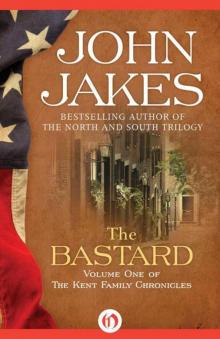 The Bastard: The Kent Family Chronicles
The Bastard: The Kent Family Chronicles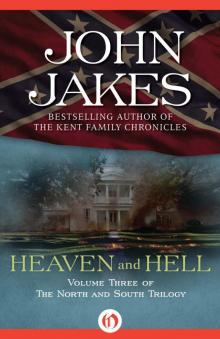 Heaven and Hell: The North and South Trilogy (Book Three)
Heaven and Hell: The North and South Trilogy (Book Three)